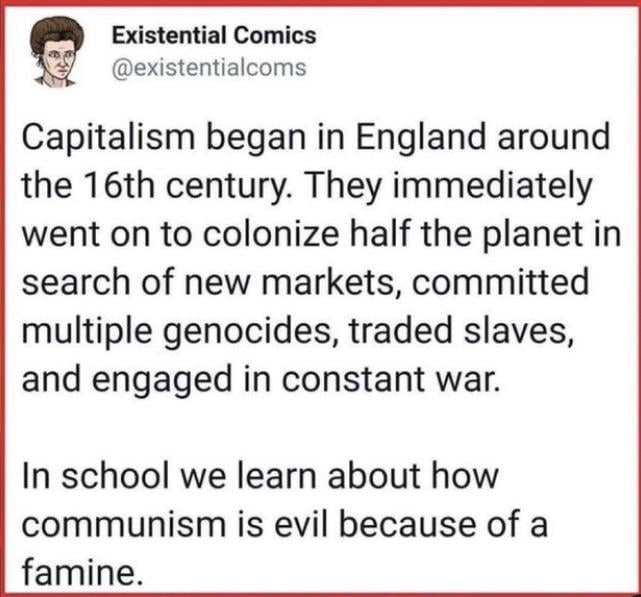Late Stage Capitalism
A place for for news, discussion, memes, and links criticizing capitalism and advancing viewpoints that challenge liberal capitalist ideology. That means any support for any liberal capitalist political party (like the Democrats) is strictly prohibited.
A zero-tolerance policy for bigotry of any kind. Failure to respect this will result in a ban.
RULES:
1 Understand the left starts at anti-capitalism.
2 No Trolling
3 No capitalist apologia, anti-socialism, or liberalism, liberalism is in direct conflict with the left. Support for capitalism or for the parties or ideologies that uphold it are not welcome or tolerated.
4 No imperialism, conservatism, reactionism or Zionism, lessor evil rhetoric. Dismissing 3rd party votes or 'wasted votes on 3rd party' is lessor evil rhetoric.
5 No bigotry, no racism, sexism, antisemitism, homophobia, transphobia, ableism, or any type of prejudice.
6 Be civil in comments and no accusations of being a bot, 'paid by Putin,' Tankie, etc.
view the rest of the comments

― Michael Parenti, Blackshirts and Reds: Rational Fascism and the Overthrow of Communism
Additionally, check out Willam Blum's "Killing Hope" (pdf link), and/or "America's Deadliest Export", by same (pdf link).
That quote basically describes every politician from every ideology that has ever lived. You can literally swap out communism for other words and it still reads the same.
Its got no substance or citations of factual events. Basically word salad.
Yeah, the citations of factual events are in the links below the quote. Check out Willam Blum's "Killing Hope" (pdf link) for more citations than you can shake a stick at.
I'm not going to waste any more hours of my life reading substanceless tankie bullshit than I have, thanks.
Scared it might not confirm your biases?
Do you sit down and read political theory books written by hedge fund managers?
It's okay to write off low value sources, it doesn't make you biased.
Yes, in fact, I do. I specifically seek out and read literature from people with whom I have knee-jerk disagreements.
How else will I be sure I'm not trapped in a thought bubble? It's important to read critically from a variety of sources, while reserving judgement. That's literally how you learn. It's too easy to fall for propaganda, otherwise.
Whats your favorite?
I'm not sure "favorite" is something I can quantify for you with such ease, as I'm not ranking my favorite movies/spectacles, here. We're discussing engaging with things that don't just pet and soothe your inbuilt biases. It'd be like asking my favorite college coursework textbook.
I most recently digested George Soros' "Alchemy Of Finance" via audiobook, (though I'm not sure he really qualifies as a hedge fund manager, exactly). I'm no fan of his hyper-neo-liberal leanings, but why should I be scared to read what he has to say about finance? I have time. His musings on reflexivity were compelling enough, I guess.
I've also recently plowed through Anne Case and Angus Deaton's "Deaths Of Despair". I've historically chafed against Deaton's particular brand of neo-lib economics. It seems he's had something of a mea culpa moment in the past few years, since his Nobel prize in Econ, because he's been running around pissing off a bunch of economists with articles like these.
If you have any recommendations I'm open to them!
Guess what I didn't read just now?
What do you want, a cookie? What are you getting out of this? Just bored?